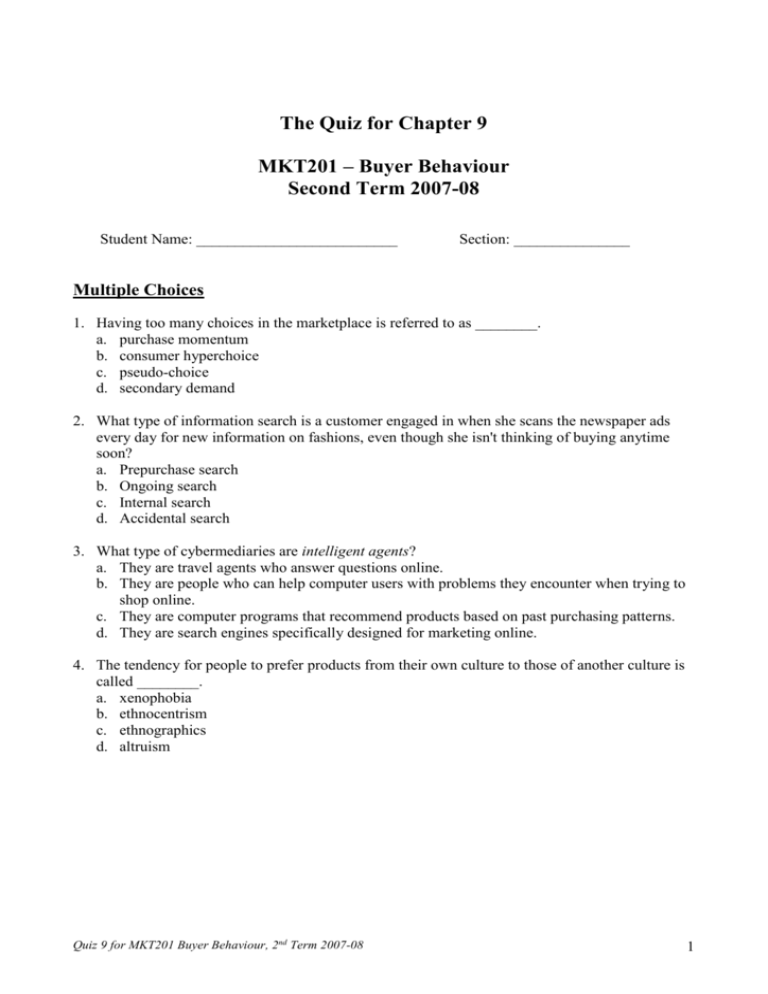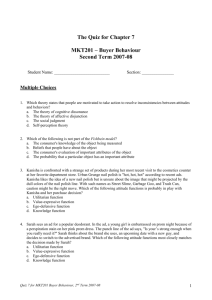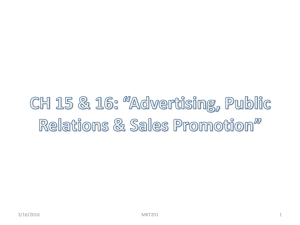Review9
advertisement

The Quiz for Chapter 9 MKT201 – Buyer Behaviour Second Term 2007-08 Student Name: __________________________ Section: _______________ Multiple Choices 1. Having too many choices in the marketplace is referred to as ________. a. purchase momentum b. consumer hyperchoice c. pseudo-choice d. secondary demand 2. What type of information search is a customer engaged in when she scans the newspaper ads every day for new information on fashions, even though she isn't thinking of buying anytime soon? a. Prepurchase search b. Ongoing search c. Internal search d. Accidental search 3. What type of cybermediaries are intelligent agents? a. They are travel agents who answer questions online. b. They are people who can help computer users with problems they encounter when trying to shop online. c. They are computer programs that recommend products based on past purchasing patterns. d. They are search engines specifically designed for marketing online. 4. The tendency for people to prefer products from their own culture to those of another culture is called ________. a. xenophobia b. ethnocentrism c. ethnographics d. altruism Quiz 9 for MKT201 Buyer Behaviour, 2nd Term 2007-08 1 5. Simple decision rules are ________, meaning that a product with a low standing on one attribute cannot make up for this position by being better on another attribute. a. noncompensatory b. habit decision rules c. compensatory d. conjunctive rules 6. Jeff is tired of the numerous breakdowns and peeling paint on his old car. When Jeff begins to actively think about his car in this way, which of the following consumer decision-making process steps is Jeff going through? a. Information search b. Evaluation of alternatives c. Problem recognition d. Product choice 7. Chet decides to buy a new hedge trimmer to care for his bushes and shrubs. Because Chet is familiar with the local lawn and garden shop and the brands that are carried there, he uses a few simple decision rules to arrive at a purchase option. Chet is following which of the following buying decision behavior continuum alternatives to make his decision? a. Routine response behavior b. Limited problem solving c. Graduated response behavior d. Extensive problem solving 8. Les just bought a megaphone of root beer. As he drinks from the giant cup, he eventually becomes full. One of his friend's comments, "If you don't stop drinking that stuff, you will get sick." Les replies, "Hey, I bought it and I am not going to waste one drop of it." Les's behavior could best be described by which of the following mental biases to his decision-making process? a. Loss aversion b. Framing c. Risk positioning d. The sunk-cost fallacy 9. Jamie is considering ordering a dessert for lunch. Before she ever decides on the kind she prefers, she must decide whether to get a fattening or nonfattening dessert. This decision relates to which of the following levels of abstraction of dessert categories? a. Superordinate level b. Ordinate level c. Subordinate level d. Basic level 10. Mel Howard is determined to make his used car lot a successful business venture. One of the cornerstones of his sales strategy is to make every used car appear as if it just rolled off the assembly line. His cars are clean, clean, clean. Mr. Howard is relying on which of the following terms to send a signal of quality to his customers? a. Demonstration signal b. Product signal c. Promotional signal d. Design signal Quiz 9 for MKT201 Buyer Behaviour, 2nd Term 2007-08 2 Short Answers 1. Compare limited versus extended problem solving. ___________________________________________________________________________________ ___________________________________________________________________________________ ___________________________________________________________________________________ ___________________________________________________________________________________ ___________________________________________________________________________________ ___________________________________________________________________________________ ___________________________________________________________________________________ ___________________________________________________________________________________ ___________________________________________________________________________________ ___________________________________________________________________________________ ___________________________________________________________________________________ ___________________________________________________________________________________ ___________________________________________________________________________________ 2. List the five stages of the consumer decision-making process. Define each of the major stages. Provide an example that demonstrates how a consumer might progress through the model. ___________________________________________________________________________________ ___________________________________________________________________________________ ___________________________________________________________________________________ ___________________________________________________________________________________ ___________________________________________________________________________________ ___________________________________________________________________________________ ___________________________________________________________________________________ ___________________________________________________________________________________ ___________________________________________________________________________________ ___________________________________________________________________________________ ___________________________________________________________________________________ ___________________________________________________________________________________ ___________________________________________________________________________________ End-of-questions Quiz 9 for MKT201 Buyer Behaviour, 2nd Term 2007-08 3







